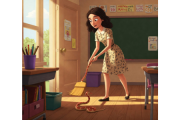Mother had a teaching certificate and had passed her Grade Nine piano examination. In addition to teaching elementary school she taught piano. You couldn’t charge much for music lessons but still every cent counted. During the war she and a couple of her former schoolmates formed a small band – piano, sax, violin and drums – and toured locally. Again the pay was minimal but at the same time they enjoyed themselves and so did the dancers. Mom didn’t care to dance but Dad did. He never had a problem re partners because he was an excellent dancer. This arrangement suited both of them.
As children we were very much a part of our farm economy. Regularly the three of us paraded through the wheat fields gathering all the weeds that we could carry or put in a sack. This is called “rogueing”. Rogueing improved the value of grain and insured that crops would not be competing for moisture and nutrients. Most of the weeds were quite pig friendly and our “porkers” delighted in their weedy salads.
Aside from helping with chores we had our own entrepreneurial pursuits. These included digging Seneca root, collecting gopher tails, muskrat trapping and salvaging beer bottles. Seneca Root was gathered and sold to the grocer in the hamlet of Daphne. Eventually it would be processed for medicinal purposes and even today it is an ingredient in many cough medicines. Now it is not harvested from the wild. Its “wild” doesn’t exist anymore.
Collecting gopher tails was a nasty business but most farmers were still using horses and a horse could break a leg stepping into networks of gopher holes. Gophers were very destructive of crops. When dealing with them my brother assumed the role of batter and my sister and I were water girls. Gophers always had more than one hole so Celeste and I would pour pails of water down one and Tom would despatch each gopher with a crashing blow to its head as it sought to escape its now water filled abode. I think he must have removed the tails too. I certainly didn’t! The tails were sold at the local grain elevator, also in Daphne. Two cents a tail, I believe.
I did not participate in muskrat trapping. Tom and his friend did that. I can’t remember where these were sold but there is still a market for them. Tom and Jim didn’t stop there. They also launched into the beer bottle business. There was a community dance hall in Daphne and after the Friday dances numerous bottles were to be found in local ditches. Bottles had to be washed before they could be sold. Both boys made enough with this enterprise to purchase their own bicycles! At the time I thought they were quite unique but a little research indicates that they weren’t the only lads in this business during the 30’s and 40’s.
There is strength in numbers. We all knew how to work together whatever the task might be. That capacity helped our community to get through difficult times. Savvy and Caring. A powerful combination!





